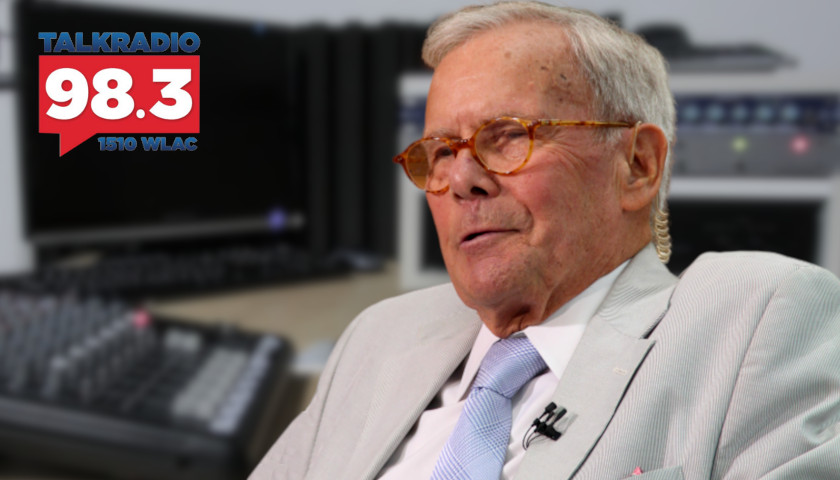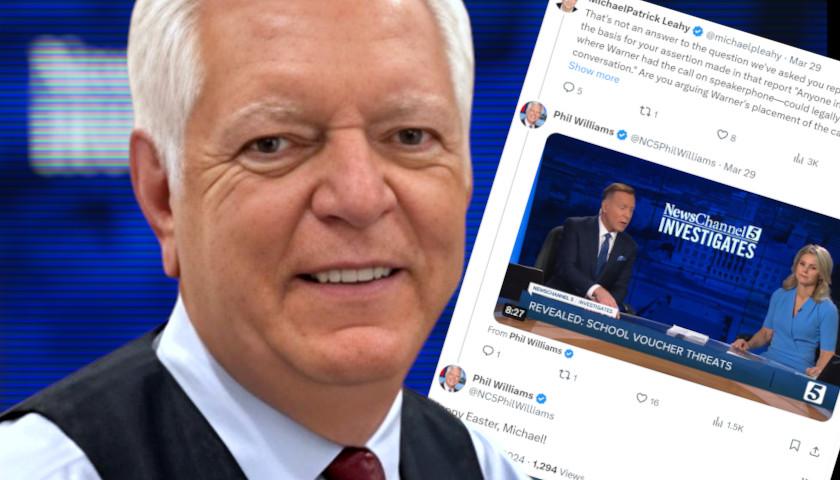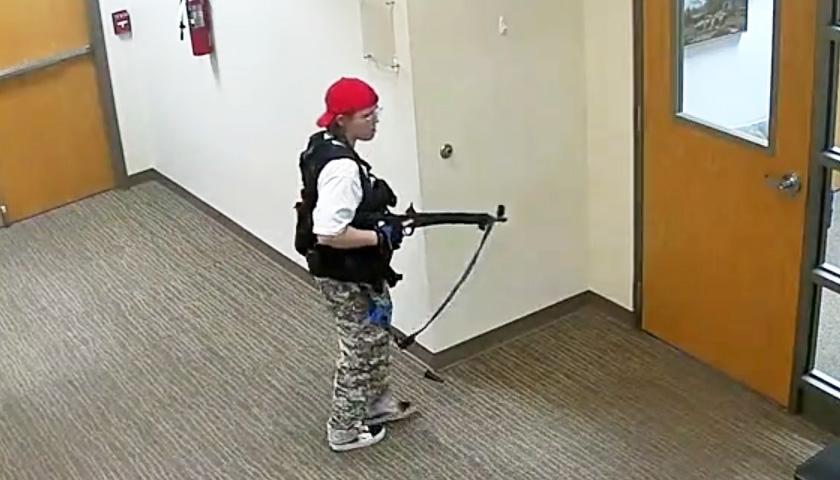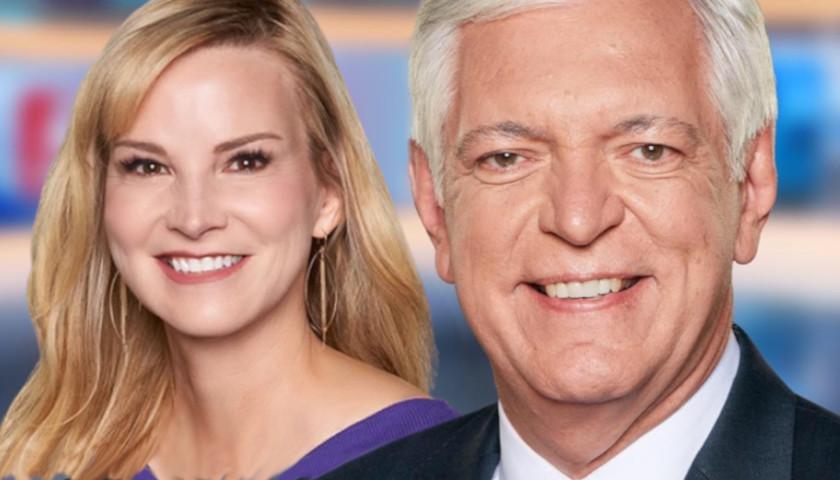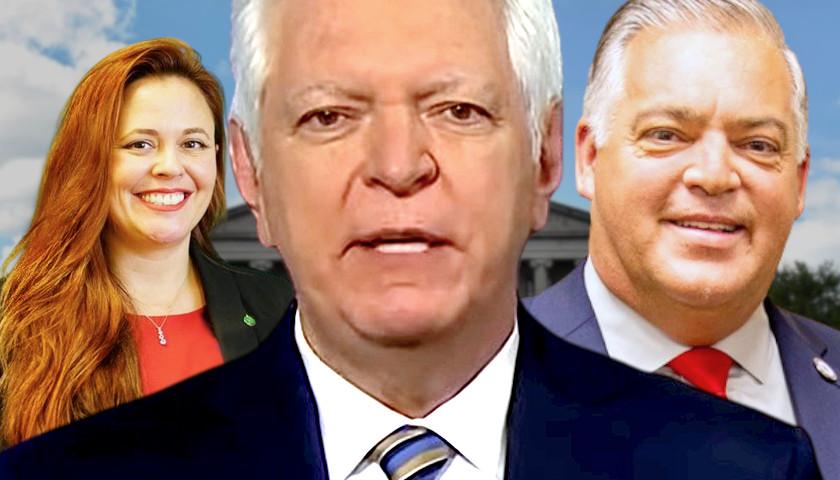Live from Music Row Friday morning on the Tennessee Star Report with Michael Patrick Leahy – broadcast on Nashville’s Talk Radio 98.3 and 1510 WLAC weekdays from 5:00 am to 8:00 am – Leahy was joined on the newsmakers line by legendary journalist, author and special correspondent for NBC News Tom Brokaw to discuss his new book The Fall of Richard Nixon.
Brokaw and Leahy discussed the differences in today’s media versus his time as a journalist with NBC. Brokaw went on to describe what he saw in today’s impeachment proceedings and compared it to that of Nixon’s noting how his team felt bulletproof. He states: “I think because there was so much hubris on the Nixon team because they had such an enormous victory in the election that year and they felt they were bulletproof. Well, it turns out the rule of law still prevails.”
Leahy: We are joined now on the phone by a good friend, all-around good guy, former NBC news anchor, currently a contributor to NBC News, and author of the new book on Richard Nixon, The Fall of Richard Nixon. Tom Brokaw. Good morning Tom.
Brokaw: Good morning Michael. How are you?
Leahy: Great to have you on. Nice piece by the way on CBS Monday morning with your long-time colleague Jane Pauley. I watched that and really enjoyed it.
Brokaw: We probably should have put something down at the bottom that said, these two people love each other so be careful about how your report. (Laughter) We really met in the fall of, I have to go back now, 1978 when we started on the Today Show together. Jane was 25 years old out of Chicago.
Not a lot of experience. And the Today Show was a mess because it always had the ability to just do whatever it wanted to because there was no competition. David Hartman comes along on ABC and suddenly there’s a lot of competition. So Jane and I have often described this as passengers on Das Boat.
We were set afloat out there in the ocean and told to find our way. And we became very, very close friends. And it was wonderful to have her come to Montana and then go through parts of my life that I don’t talk about very much including my cancer. It was a great reunion.
Leahy: So, Tom, there was a clip in that little segment of you in 1973 questioning President Richard Nixon about some of the impeachment issues. And you have now this book on The Fall of Richard Nixon. And by the way, our good friend Steve Bannon has read it. I talked to him last night about it and he says it’s a terrific book.
And you know he’s doing this War Room Impeachment podcast. I’ll just relay this, he would love to have you on as a guest there. I wanted to just note that your book comes out very timely. It’s about that whole year leading up to the resignation of Richard Nixon in August of 1974. Can you compare and contrast the current impeachment proceedings with those impeachment hearings?
Brokaw: I really can but I can’t at the same time. The common theme obviously is an impeachment hearing. But President Nixon, most of his principle aids were either going to jail or were already in jail for rules violations of not just the ethics but the law in this land.
And there were tape recordings of him talking about “it would take a couple of million dollars we can do that whatever it takes.” Nonetheless, and this is what I think the American people have to keep in mind. It took a full year for that to come to fruition to have him finally face up to his wrongdoing and Republican members of the House and Senate after the Supreme Court released the tapes in effect saying, ok, enough is enough. We’re really are going to have an impeachment proceeding here.
Now we’re still in the I’d say second, third, or fourth innings at this point. And as I watch all of this I think, I try to always put myself in the minds of my fellow South Dakotans or Montana where I spend a lot of time out there in America where they don’t get up every morning and tune in to what’s going on in Washington. I think there’s probably a lot of confusion among Democrats and Republicans. Ukraine, where’s Ukraine again?
Leahy: Exactly. (Chuckles)
Brokaw: Why do we care about it? And then the other contrast obviously is that I do think whatever your political philosophy may be, you should be proud of the people who served this country as professionals. Most of those people who are coming forward in the foreign service or other government have had postings all over the world.
They’ve dedicated themselves to the idea of doing what’s best for the country. And they don’t come loaded up I think with a lot of personal ideology. They just want to reflect on what they’re seeing. Now having said that, Republicans have a panel and have a right to go after them however they can.
And Democrats on the panel are trying to build them up as much as they can. In some ways, it’s important for the American people to see the system at work. We are a land of laws. A land of procedures. And we play this out not at the end of the point of a gun, but we play this out in a hearing room. And some of it is obviously over the top on both sides.
I’ve been a little surprised that the Republicans have not shown a little more empathy I suppose is the best way of viewing it. A kind of admiration for the pros who are out there in those remote places. Sometimes very tough duty. I thought it was pretty outrageous for the President to say: “Well, she served in Somalia. Where did that get us?”
I’ve been to Somalia. It’s the most dangerous place I’ve ever been to in my life quite honestly. And for him to belittle her service there, I thought was not just unbecoming but it was kind of a cheap shot. On the other hand, there are people on the Democratic side who probably are overreaching a little bit as well. So I leave it to the wisdom of the American people to decide at the end of the day. Where do we go from here?
Leahy: My recollection Tom is that the House impeachment proceedings began in the judiciary committee in 1973 with Chairman Peter Rodino. Is that how it got started?
Brokaw: That was actually kind of almost mid-travel. You’ve got to remember the hearings in the summer before the special committee.
Leahy: Oh, that’s right. It was the summer before the special committee. I remember watching those in June 1973 just out of high school.
Brokaw: The whole country did. Sam Erwin from South Carolina and Howard Baker from Tennessee. One a Republican and one a Democrat. And then the other members of the committee and they had Bob Haldeman before them. And John Ehrlichman before them.
And John Dean before them. And they were all it turns out lying and they were going to prison for their lies. I think because there was so much hubris on the Nixon team because they had such an enormous victory in the election that year and they felt they were bulletproof. Well, it turns out the rule of law still prevails.
Leahy: If you would talk a little bit about, what comes to my mind is the conduct of Chairman Peter Rodino in the House Judiciary Committee when he conducted those hearings. It seems to me to be very different from the conduct of Adam Schiff in these Intelligence Committee hearings. Do I have that right?
Brokaw: I think that you do. By and large, it was a different time. Now we live in an environment in which everything is on-air or online 24/7. So the rules have kind of changed. It would be interesting to see what Peter Rodino would do under these circumstances.
Because when they were having those hearings you couldn’t watch them all day every day. There was a fair amount of them that got on the air. But the fact of the matter is, I’ve often said to people as a White House correspondent, we’d have a press briefing at 10:00 in the morning.
I wouldn’t go on the air till 6:30 that night on the Nightly News. Now, bang! You’re on the air and you’ve got to make quick judgments. And you’ve got to spread if you will, whatever you know or don’t know across all the airways. So times have changed. But Peter was a little known congressman.
He was a war hero and he took it very seriously. He in fact even had health problems because he was so anxious about what was going on. It was a different time and a different system. We have to deal with the hand that we’ve been given. and now forevermore everything will be on the air all day long.
Leahy: Tom, how did you decide to write a book on The Fall of Richard Nixon and have it come out last month which is very timely with the current impeachment inquiry of President Trump? How did that process come about in your mind?
Brokaw: (Chuckles) I would like to say I was prescient. Jon Meacham who is an editorial consultant at Random House where I do my publishing and a great friend. I was trying to decide on a project. Why don’t you do a reported view of what went on during Watergate? He said that’s a great journalistic technique.
People kind of first-hand witnesses to it. My god, I don’t know if everything had been said about it. And as I began to refresh my memory I thought there parts of that both personal and a professional way that the country would probably like to hear again.
And then there have been so many new generations that have come along. Any number of younger people have said to me, ‘Oh my god. I had no idea that that’s how it went down.’ Circumstances where much different then as I said a moment ago, we weren’t on the air 24/7.
We didn’t have social media. So I would get briefed at 10 am in the morning and spend the rest of the day making phone calls and preparing for the NBC Nightly News at 6:30 at night. I wasn’t on between 11 in the morning and 6:00 offering opinions and trying to keep up with whatever was going on.
It was kind of, if you will, a stately pace about how we absorbed this information. That will never ever be recaptured again because of modern communication.
Leahy: Yeah. So you went to Washington as the correspondent in ’73. What month in ’73 did you show up in the White House as a correspondent?
Brokaw: It was the summer of ’73. My background was kind of interesting. I got lucky and I got hired by NBC when I was 26 years old in Los Angeles. And they were wise, I put that in quotation marks assignment editor say you know what about politics. There’s this actor running, why don’t you get on the bus with Ronald Reagan. (Leahy laughs)
So that was my first big break. And then I developed a reputation for knowing California politics. And I met Bob Halderman before the rest of the country met Bob Halderman. He was a great civic-minded citizen in Los Angeles.
He ran J. Walter Thompson. He was on the board of regents. And we got to know each other quite well. I could count on him when I called about what was going on in the Republican party. And I remember vividly saying when Nixon announced that he was going to run again.
I said, Bob are you going to go with him this time? And he said, no, been there done that. Then Pat Buchanan says, then we’d be in to pick up scene. Suddenly there was Bob Halderman. And he was an extraordinarily organized guy but judgment left him at some point as it did a lot of them. The hubris which is often the case, Republican or Democrat alike. They get power and they think they’re bulletproof.
Leahy: And Tom Brokaw, you document it in your new book on The Fall of Richard Nixon. Tom, my good friend, thanks so much for taking the time to join us today on the Tennessee Star Report.
Brokaw: Michael, thank you very much for having me.
Listen to the full second hour:
– – –
Tune in weekdays from 5:00 – 8:00 am to the Tennessee Star Report with Michael Patrick Leahy on Talk Radio 98.3 FM WLAC 1510. Listen online at iHeart Radio.
Photo “Tom Brokaw” by fourandsixty. CC BY-SA 4.0.

